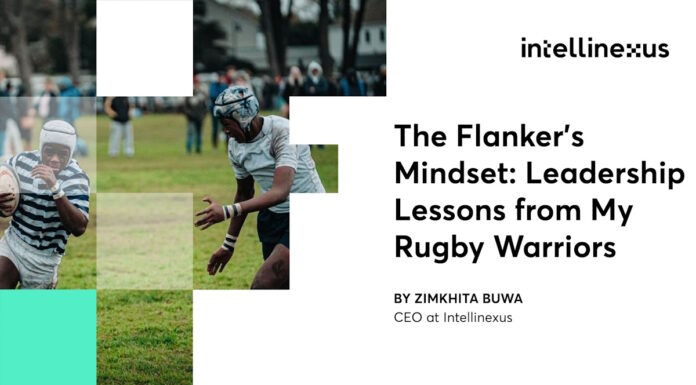
[ad_1]
Lessons from my rugby warriors.
Rugby is my passion. I am one of those supporters who shouts and paces on the side of the rugby field. As I watch players navigate the white lines each weekend, their determination visible on their mud-splattered faces, I can’t help but smile at the striking parallels between this beloved sport and the principles of effective leadership. I’ve come to realise that rugby is an 80-minute masterclass in teamwork and leadership.
There’s something special about watching my nephew and son play in the Number 7 position – the open-side flanker role that demands a unique combination of speed, strength and strategic thinking. I particularly love that my son, breaking from convention, once took up the challenge of kicking for poles – a rare sight for a flanker! This willingness to step outside traditional role boundaries perfectly illustrates how modern leadership requires us to wear multiple hats and seize unexpected opportunities.
Take the breakdown, where flankers truly shine. As Number 7s, they are the workhorse of rugby and masters of the art of the turnover – those crucial steals where possession can swing from one team to another. It’s similar to those pivotal moments in business where the ability to spot and capitalise on opportunities can completely change the game. Watching them tackle, ruck, maul and even kick has striking similarities to how effective leaders must be versatile and ready to step up wherever needed. Though I must admit, the boardroom generally involves less tackling (thankfully!).
But perhaps the most beautiful aspect of rugby is the understanding of failure and resilience. When a tackle is missed or a turnover opportunity lost, the team doesn’t stop. Instead, they regroup, adjust their strategy and push forward. This mirrors the agile approach we take in tech leadership – fail fast, learn faster and keep moving forward.
The concept of support in rugby is particularly enlightening. As Number 7s, their role is to support both attack and defence. In business, this translates to creating a culture where team members actively support each other, ready to step in when colleagues need backup or face challenges.
The post-match tradition of teams sharing a meal together, regardless of the game’s outcome, reminds us that competition and respect aren’t mutually exclusive. In business, we can fiercely compete in the market while maintaining professional partnerships and industry collaboration.
Watching from the sidelines, I’ve gained a deeper appreciation for how rugby shapes character and develops leadership skills. The mud-stained jerseys and grass-burned knees are badges of commitment, teamwork and resilience, which are qualities that are just as valuable in the boardroom as they are on the rugby field.
What truly inspires me, though, is watching the boys show up every single weekend, despite their teams’ struggling win rate. In a season where victories have been hard to come by, their unwavering commitment speaks volumes about character. Every Saturday morning, they lace up their boots and approach their warm-up with the same enthusiasm or “gees” as if they were heading to a URC championship match.
This kind of resilience, showing up fully committed when the scoreboard hasn’t been kind, is perhaps one of the most valuable leadership lessons. In business, as in rugby, not every season or quarter is a winning one. There are times when, despite your best strategies and efforts, the deals are hard to come by and the results don’t reflect the work you’re putting in. But watching these young warriors dive into every ruck, contest every scrum, and chase every kick with unwavering determination, regardless of their previous game’s outcome, has taught me something profound about leadership: it’s not about the win-loss record, it’s about the consistency of your effort and the integrity of your performance.
There was that heart-stopping moment when they were both plagued by injuries – a stark reminder of rugby’s intensity and the paramount importance of proper protocols and player safety. Watching them methodically work through their rehabilitation programme with the same dedication they brought to the breakdown showed me that setbacks, while challenging, can be powerful teachers of determination and mental toughness
As both a CEO and a rugby mom, I can confidently say that rugby’s greatest lesson for business isn’t found in its strategies or structures, but in its spirit. On the rugby field, success isn’t merely measured by the scoreboard, but by the courage to get up after every tackle, the humility to learn from every loss and the wisdom to know that your greatest strength lies not in individual brilliance, but in the collective power of your team. In both rugby and business, true leadership emerges not from avoiding challenges, but from facing them head-on, with equal parts grit and grace. Whether you’re in the ruck or in the boardroom, the principles remain unchanged: show up with purpose, back your team and remember that every setback is simply setting you up for your next breakthrough.
And if you’re wondering whether rugby or business is more challenging, I’d say they’re neck and neck – though business meetings rarely require ice packs afterwards!
[ad_2]
Copyright for syndicated content belongs to the linked Source link

